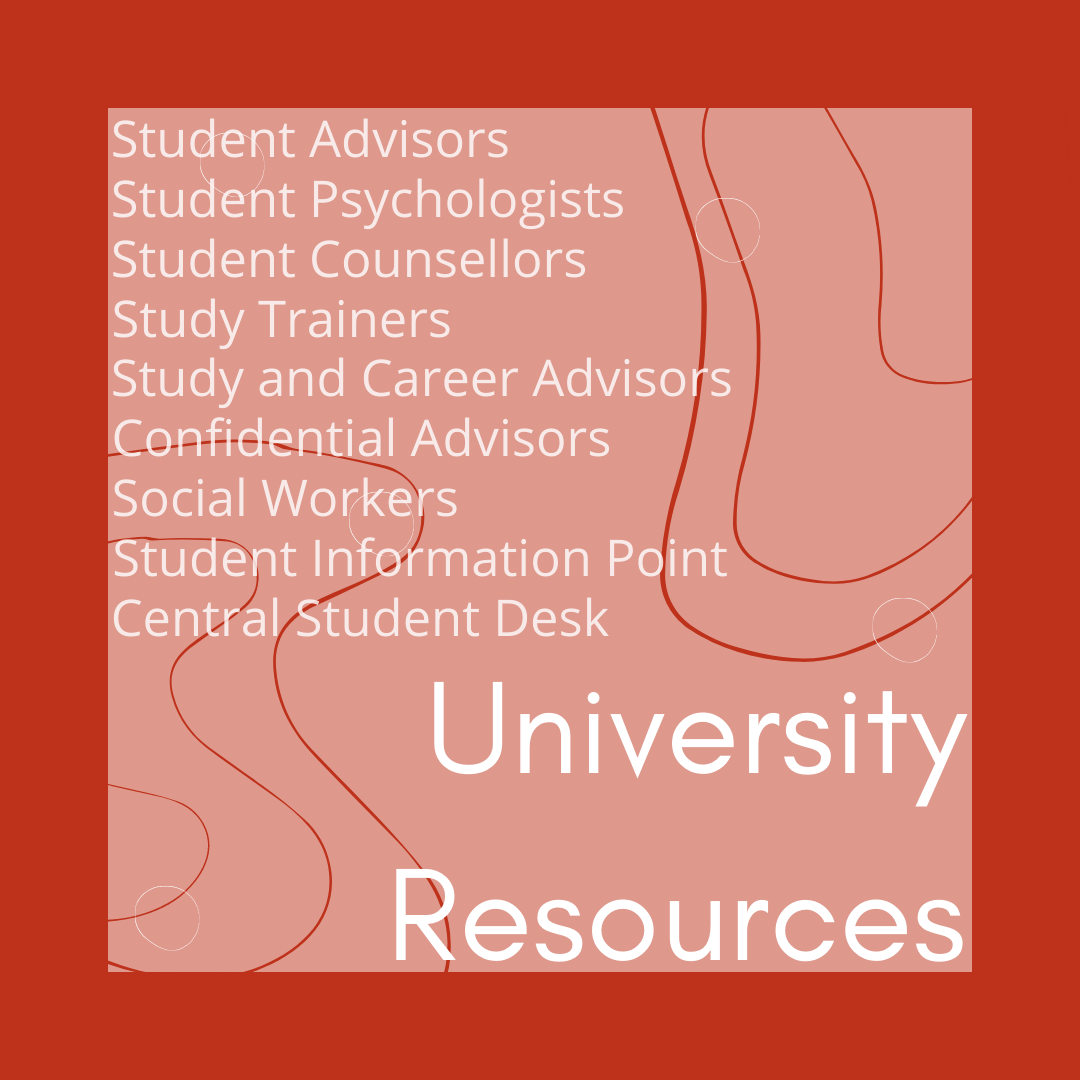University Resources; an overview

Sun, 30 Jan 2022
written by Emiel Villerius
There's many different kinds of issues faced by students today, ranging from troubles in our studies to more personal issues. The university has some resources which you can use in these cases, below is an overview of the most important ones. You can also find more information here.
1. Student advisor
You may have heard about the student advisor before, whether at the Personal Professional Skills B1 or during your studies through your fellow students. The study advisors are specific to our A.I. programme and you can find them here. They are the usually the first point of contact for anyone with all kinds of issues or questions, these do not have to be strictly about your studies! The student advisor knows a lot about our study programme so they can help you if you are worried about your study progress or have issues with e.g. reaching your BSA. If necessary, the student advisor can also refer you to other organs within the student support network, such as the student psychologist. If you are unsure where to go or who to contact, always go to the student advisor first!
2. Student psychologist
The student psychologists help and guide all students with personal and study-related problems. They can help you if you suffer from anxiety, depression or negative thoughts during your studies. They also offer ways to help you if you are dealing with perfectionism, have problems concentrating or finding motivation. To schedule an appointment you can fill in an online questionnaire in Osiris. The student psychologists also have the ability to register you for some of the courses, training sessions and workshops that student support offers. An overview of these can be found on this page.
3. Student counsellor
The student counsellor can help you if you have special needs (e.g. dyslexia, ADHD, ADD, autism, depression, chronic health conditions, physical disability, etc.), are experiencing financial problems or are at risk of a study delay. They are also available to talk if you have questions regarding the rules and regulations that apply to the Radboud University or if you are interested in adapted study options. They are also here to support you if you are a top athlete. The student counsellor helps you figure out how to organise your studies such that they can fit your life best. You can make an appointment with the student counsellor here.
4. Study trainer
The study trainers are there for you if you are experiencing issues with studying, for example procrastination or disappointing results. They can also help if you have such trouble studying or structuring your time that it causes you emotional problems. They offer a range of online courses on Brightspace and meetings with trainers to discuss your personal situation. To make an appointment you can fill in a questionnaire in Osiris.
5. Study and career advisor
The study and career advisors can help you if you are feeling uncertain about your choice of study or if you are unsure about choosing a Master's programme. They can also help you figure out what you want to do once you have obtained a degree. Some special help is also there for career orientation in combination with disabilities. They are a part of the Radboud Career Service, which also offers some workshops and training courses that can help you with finding your perfect job. If you are feeling pressured by the uncertainty of your job opportunities or if you are not even sure that Artificial Intelligence is the study for you you can make an appointment by filling in a questionnaire in Osiris.
6. Confidential advisor
If you have experienced undesirable behaviour, be that from other students, staff or someone else on campus the confidential advisors are here for you. It can concern improper behaviour such as sexual harassment, discrimination, aggression/violence, threatening behaviour, bullying or gossiping. It is possible that you would experience such behaviour and feel unsafe to confront this person or speak up for yourself, this is when you can go to the confidential advisors. They offer a listening ear and think along with you to find a solution. You can contact the confidential advisors by sending an e-mail to vetrouwenspersonen@ru.nl.
7. Social workers
The social workers are mostly there to help the international students at the Radboud University. As an international, you may encounter more and different challenges or problems when adjusting to life in the Netherlands. They can help you applying/registering with Dutch organisations (e.g. banks, health insurance, GPs, etc.) or when you are searching for social and medical support in Nijmegen and are unaware of the local options. They can also provide resources if you are feeling lonely and trying to build a network here. You can get in contact with them here.
8. Student Information Point (STIP)
The STIP is the central place for students of the Faculty of Social Sciences for any questions regarding your study administration (e.g. exam enrollment, applying for a diploma, contact with the exam committee) or for referral to our faculty's Career or International Office. STIP has a desk in the Maria Montessori building (room 01.012) where you can ask your questions in person or you can e-mail them at stip@socsci.ru.nl.
9. Central Student Desk
The CSD can help you with questions regarding the administration of your studies (e.g. (de-)enrollment, tuition fees, etc.), the digital environments of Radboud (e.g. RU-account, Studielink, etc.) and other formal requests (e.g. waiver for paid parking). For short questions you can e-mail them at centralstudentdesk@ru.nl at any time or call them at 024-3612345 only on working hours. You can also book an appointment if you would like to discuss more in-depth issues.
10. Urgent
If your situation is urgent contact your GP (General Practitioner) immediately. Outside of office hours you can contact the general practitioners service for Nijmegen at 0900-8880. If you are having suicidal thoughts you can call 113 Suicide Prevention at 0800-0113 free of charge or visit their website. You can also contact 113 Suicide Prevention if you are worried about someone else harming themselves.

